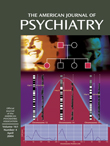Can Interpersonal Loss Precipitate Panic Disorder?
To the Editor: A central aspect of the DSM-IV diagnosis of panic disorder is that the symptoms appear to come “out of the blue.” Nonetheless, there is a substantial literature documenting psychosocial stressors precipitating panic disorder (for example, references 1 and 2) and, specifically, anxiety disorders in bereavement (3). No investigator to date, to our knowledge, has examined the frequency of events involving interpersonal loss (through death or relationship disruption) that immediately preceded the onset of panic disorder.
We examined the frequency of interpersonal loss events immediately preceding the onset of panic disorder (within 6 weeks) in two groups of patients with panic disorder, both of whom participated in the evaluation of efficacy of panic-focused psychodynamic psychotherapy at Weill Medical College of Cornell University (4).
We examined the onset of panic in 51 patients, 21 of whom had participated in an open trial of panic-focused psychodynamic psychotherapy (5) and 30 of whom had been treated in an ongoing randomized, controlled clinical trial, as rated on the Anxiety Disorders Interview Schedule for DSM-IV: Lifetime Version (6). All patients met DSM-IV criteria for panic disorder with or without agoraphobia.
Twenty-four (47%) of our patients experienced an onset of panic disorder within 6 weeks after a significant interpersonal loss. Without a control group, it is not clear whether a similar rate of interpersonal loss would be found for patients in other diagnostic groups.
Panic disorder has heretofore not been conceptualized in the psychiatric literature as an outcome of loss or a form of complicated bereavement. It will be important to determine whether other groups of panic patients experience panic onset after loss with the same high frequency. It remains to be determined whether the history of interpersonal loss in panic onset may function to moderate the outcome of specific treatment interventions (7).
1. Venturello S, Barzega G, Maina G, Bogetto F: Premorbid conditions and precipitating events in early-onset panic disorder. Compr Psychiatry 2002; 43:28–36Crossref, Medline, Google Scholar
2. Roy-Byrne PP, Geraci M, Uhde TW: Life events and the onset of panic disorder. Am J Psychiatry 1986; 143:1424–1427Link, Google Scholar
3. Jacobs S, Hansen F, Kasl S, Ostfeld A, Berkman L, Kim K: Anxiety disorders during acute bereavement: risk and risk factors. J Clin Psychiatry 1990; 51:269–274Medline, Google Scholar
4. Milrod B, Busch F, Cooper A, Shapiro T: Manual of Panic-Focused Psychodynamic Psychotherapy. Washington, DC, American Psychiatric Press, 1997Google Scholar
5. Milrod B, Busch F, Leon AC, Aronson A, Roiphe J, Rudden M, Singer M, Shapiro T, Goldman H, Richter D, Shear MK: A pilot open trial of brief psychodynamic psychotherapy for panic disorder. J Psychother Pract Res 2001; 10:239–245Medline, Google Scholar
6. Di Nardo PA, Brown TA, Barlow DH: Anxiety Disorders Interview Schedule for DSM-IV: Lifetime Version (ADIS-IV-L). New York, Graywind Publications, 1995Google Scholar
7. Kraemer HC, Wilson GT, Fairburn CG, Agras WS: Mediators and moderators of treatment effects in randomized clinical trials. Arch Gen Psychiatry 2002; 59:877–883Crossref, Medline, Google Scholar



